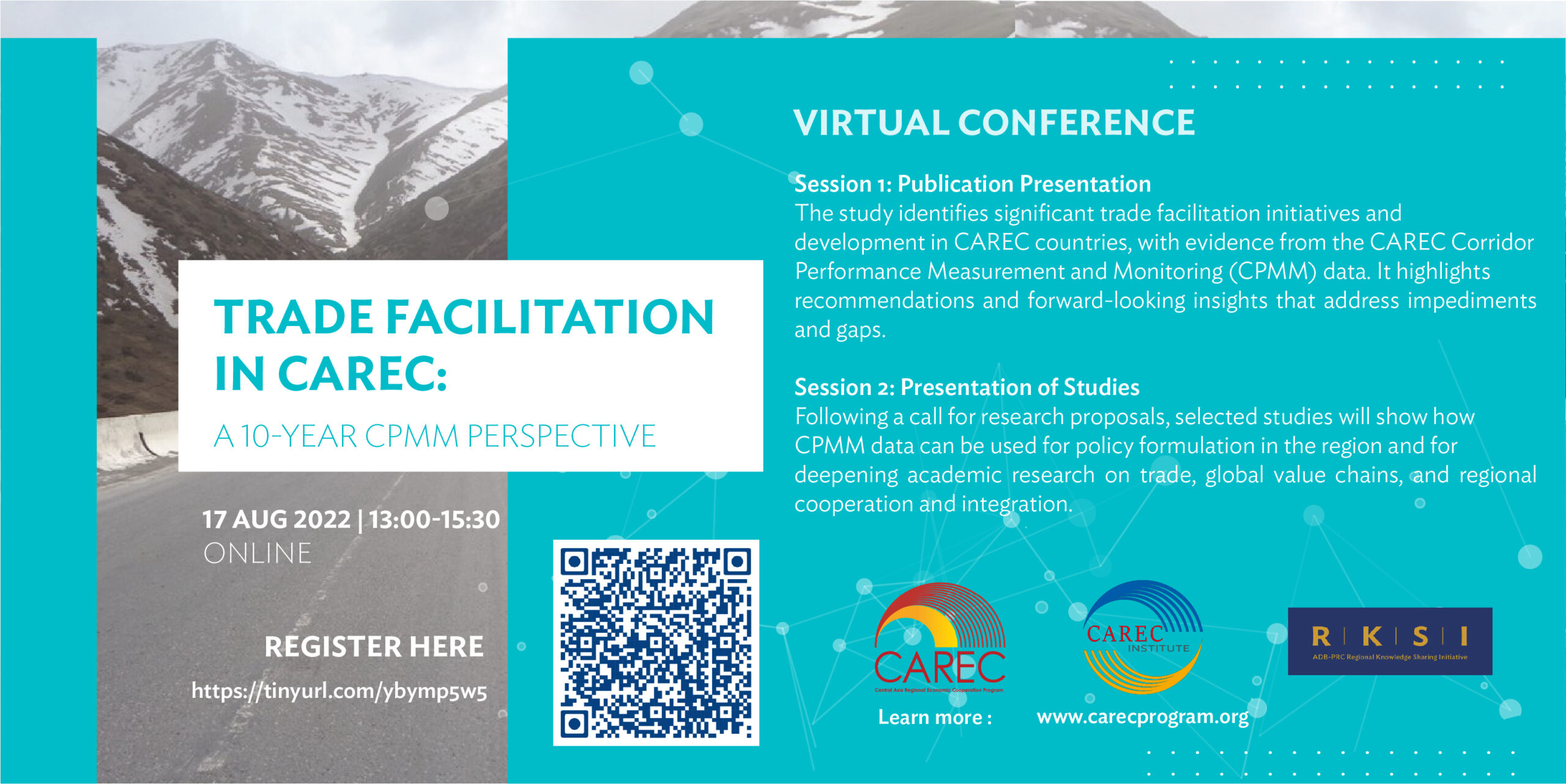Conference & Forum
Trade Facilitation in CAREC: A 10-year CPMM Perspective
1-3:30 pm Beijing Time, 17 Aug 2022 Online
The CAREC countries are mostly landlocked and exhibit the following characteristics: (i) limited integration to global value chains, (ii) lower level of regional integration, (iii) narrow range of export commodities and trading partners, (iv) relatively low value-add processing thus difficult to perform upward value migration, and (v) systematic impediments that result in ‘friction’ for cross-border movement of goods. These challenges could be attributed to both trade policy and facilitation impediments, resulting in friction when goods move across borders. Restrictions imposed due to trade tariffs, vehicle specifications, SPS standards and documentary compliance increase the time and cost to ship items. Border-crossing procedures that are cumbersome, non-transparent and under-equipped with technologies and tools are equivalent to adding significant distance in the supply chain. Thus, despite physical proximity between an origin and destination, the time and cost to transport the goods could still be comparatively higher.
CAREC trade and transport facilitation in the last 10 years. It adopted more risk management measures, streamlined border control procedures, and strived towards greater data sharing among CAREC neighbors. National single windows were adopted or under consideration. More CAREC countries entered into WTO agreements, while others became observers. Moreover, the container express train from East Asia to Europe was a significant development that shortened the economic distance, offering a transport mode much cheaper than air and much faster than ocean.
The CAREC initiative Corridor Performance Measurement and Monitoring (CPMM) has observed the development and provided empirical evidence of the region’s transport and trade facilitation for the past decade. It is an empirical tool designed to assess the efficiency of the CAREC six priority transport corridors which link the region’s key economic hubs to each other and connect landlocked CAREC countries to Eurasian and global markets. Over the years, CPMM time and cost data proved beneficial in assessing and measuring the efficiency of the CAREC corridors through its reports and various studies citing CPMM data and findings.
Register via Zoom.
Agenda:
- Teresa Kho, Director General, East Asia Department (EARD), ADB
- Yevgeniy Zhukov, Director General, Central and West Asia Department (CWRD), ADB
The study identifies significant trade facilitation initiatives and development in CAREC countries, with evidence from the CAREC Corridor Performance Measurement and Monitoring (CPMM) data. The study also highlights recommendations and forward-looking insights that address impediments and gaps. The study marks the ten years of implementation of the CPMM mechanism and underscores its value in influencing investment decision- making and in assessing the impact of policy implementation.
- Zulfia Karimova, Principal Regional Cooperation Specialist, Public Management, Financial Sector, and Regional Cooperation Division (EAPF), EARD, ADB
- Max Ee, CPMM Consultant
CPMM Success Stories: Case of Pakistan, Ilhom Abdulloev, CAREC Institute
Following a call for research proposals that employ the CPMM database on topics that include, but are not limited to, trade, regional cooperation and integration, and global value chains, selected studies will show how CPMM data can be used for policy formulation in the region and for deepening academic research in relevant areas. (10 minutes each presenter)
Moderator: Iskandar Abdullaev, Deputy Director 2, CAREC Institute
Analysis of the Impact of Trade Costs on exports of final and intermediate goods at micro and macro sectoral level in Central Asia
Presentation: Alfinura Sharafeyeva, Adjunct Fellow, School of Economics and Public Policy, University of Adelaide
Discussant: Peter Rosenkranz, Financial Sector Specialist, EAPF, EARD, ADB
The effects of lockdowns on time to clear goods at the border of the CAREC countries during the COVID-19 pandemic
Presentation: Kijin Kim, Senior Economist, Regional Cooperation and Integration Division (ERCI), Economic Research and Regional Cooperation Department (ERCD), ADB
Jerome Abesamis, Economic Analyst (Consultant), ERCD, ADB
Discussant: Lilia Aleksanyan, Economist, Regional Cooperation and
Operations Coordination Division, CWRD, ADB
Trade Facilitation, Infrastructure, and International Trade in Central Asian Countries
Presentation: Kamalbek Karymshakov, Vice-Rector, Associate Professor, Kyrgyz-Turkish Manas University Bishkek, Kyrgyz Republic
Discussant: Jules Hugot, Economist, Macroeconomics Research Division, ERCD
Geographical Proximity and Trade Impacts in the CAREC region
Presentation: Ghulam Samad, Senior Research Specialist, Research Division, CAREC Institute
Discussant: Kijin Kim, Senior Economist, ERCI, ERCD
Non-tariff measures and time and costs at border crossing points of perishable goods: Impact on CAREC intra-regional trade
Presentation: Dorothea Ramizo, Associate Economics Officer, Office of the Director General, East Asia Department, ADB
Discussant: Rolando Avendano, Economist, ERCI, ERCD
- Akiko Terada-Hagiwara, Principal Economist, EAOD, EARD, ADB


